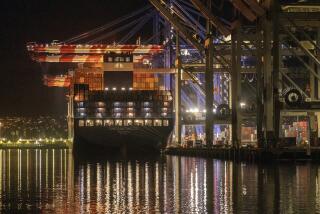Television Reviews : ‘Ocean Apart’ a Look at the U.S./U.K. Relationship
- Share via
“Pasadena was a lovely name, and so was California. . . . I thought that must be a great place to live. . . . In this promised land, the skies were always blue. . . .”
That’s how a man named John Canberry describes the Pasadena that he and other post-World War I Britons knew from Hollywood movies in the second episode of PBS’ six-part series, “An Ocean Apart” (tonight at 9 p.m. on Channels 28, 15, 50 and 24).
Representing “a form of life far beyond what we knew,” this part-real, part-fantasy Southern California was just one of the things that attracted the British of the 1920s to many things American, from music to makeup to vacuum cleaners.
“An Ocean Apart,” hosted by the BBC’s David Dimbleby, reviews the love-hate relationship between the United States and the United Kingdom, and as long as tonight’s one-hour program deals with the love part, it’s involving as well as informative.
With its fine use of largely unfamiliar archival footage, the show brightly details the more frivolous aspects of the American “assault.” The mere introduction of Woolworth stores or of the Hoover vacuum cleaner to the U.K.--and the American sales techniques that came with them--is shown to have been revolutionary and amusingly disruptive to British life.
However, the somewhat disjointed documentary is less successful in its second 30 minutes, unable to get us as interested in more big-business-oriented events, such as the attempted absorption of the British electrical industry by General Electric and other U.S. concerns.
Part of the problem may be the near-star presence (in England, anyway, where he’s famous) of Dimbleby. The program becomes narration-heavy in its second half--much in need of the original sights and sounds (such as actress Constance Bennett in a how-to-apply-cosmetics short) that spark the first half.
Nevertheless, “Home in Pasadena” is a valuable history lesson. And a topical one: Though the comparison isn’t mentioned, many viewers may note that the wound to British pride shown here--caused by superior U.S. products and approaches--can be found paralleled in our country’s current groaning and moaning over its trade relationship with that other island country across that other ocean.
The series is a BBC-TV production in association with KCET/Los Angeles and WNET/New York.
More to Read
The complete guide to home viewing
Get Screen Gab for everything about the TV shows and streaming movies everyone’s talking about.
You may occasionally receive promotional content from the Los Angeles Times.






